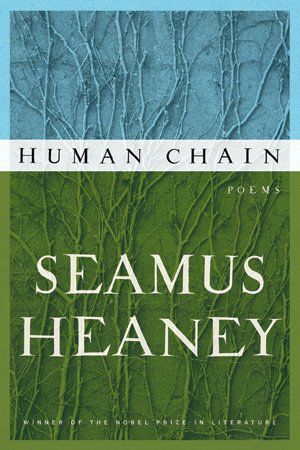
As a famous poet, Seamus Heaney is often considered in isolation, but Heaney himself has always focused on what links people, generations, and cultures—questions of inheritance and transmission. In the title poem of his new collection, Human Chain, Heaney describes aid workers as they pass bags of meal from one to another: "Nothing surpassed/That quick unburdening, backbreak's truest payback,/A letting go which will not come again./Or it will, once. And for all." That "for all," of course, is death. The lightness of hands accustomed to bearing weight is an arresting and satisfying image, a kind of catch-and-release typical of Heaney's poetry. Read in sequence with the two poems that precede it, however, what is evocative becomes more unsettling. On the facing page is a poem called "Miracle," which describes emergency medical responders unburdening themselves of a heavy stretcher. In the poem before that, "Chanson d'Aventure," it's the narrator himself who is laid out on the stretcher.
An awareness of the "bright no-where" of death, as Heaney called it in an elegy to his mother, has been one of his subjects for more than 20 years, and with increasing frequency he has taken to dedicating his poems to those who have died. What sets Human Chain apart is Heaney's new orientation. It is Heaney's first book since he had a stroke, in 2006. This is poetry written from within that bright nowhere, as it were—death isn't only an inevitability on the horizon; it surrounds him. The line has been crossed; this is poetry from the other side. "I had my existence. I was there./Me in place and the place in me," Heaney writes in the strange and enchanting "A Herbal," a poem that begins by describing the plants that grow from graves. Note the past tense, along with the entanglement of person and place.
Heaney's place is Ireland. Ireland's mythology and strife, the dirt of its land and the habits of its people, the bombs and the farms, have been his constant concerns. They still are, but this work is more intimate. Cuchulain is still here and so is Bloody Sunday, but there is a sense of diminution and modesty, an intensely personal connection to the subjects and figures raided from earlier work and life. The ceasefire in Ireland surely contributed to the quieter tone in recent years, but the recalibration is not merely political. Where once Heaney imagined a pen as a gun or spade, now it's merely a pen, the early metaphors slyly referenced with the words "in the mottled barrel a spatulate, thin/pump-action lever." But to a fearful child about to leave for boarding school, a pen has its own power, as a way to write home. In "Route 110," Virgil—long a guiding spirit for Heaney—leads him along his childhood bus route from his youth to the birth of his grandchildren. A life takes on its own geography; so does a body of work—places to be revisited, remembered, reimagined.
Absences define such a landscape as much as what's there. "The door was open and the house was dark," Heaney writes in an awesomely eerie elegy for his friend David Hammond: "Wherefore I called his name, although I knew/The answer this time would be silence/That kept me standing listening while it grew/Backwards and down and out into the street."
Heaney's attention to the strange clamor of that silence is one of the things that keeps him from nostalgia or sentimentality. So is his unflinching insistence on labor. More and more, the work is lifting bodies that are too old or sick to carry themselves. But it is also lifting the pen.
Uncommon Knowledge
Newsweek is committed to challenging conventional wisdom and finding connections in the search for common ground.
Newsweek is committed to challenging conventional wisdom and finding connections in the search for common ground.





